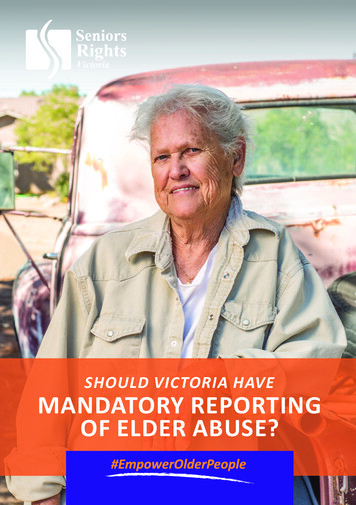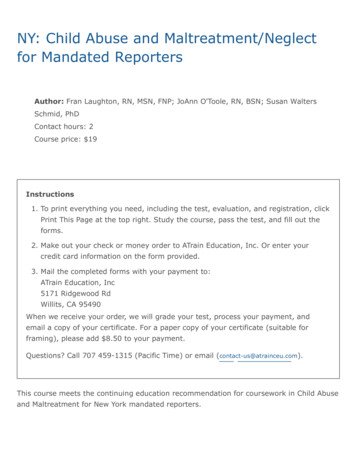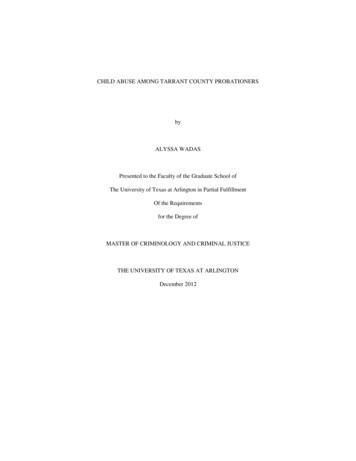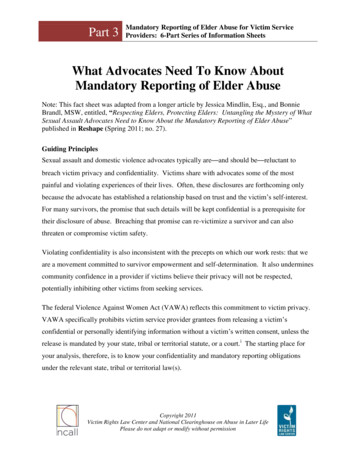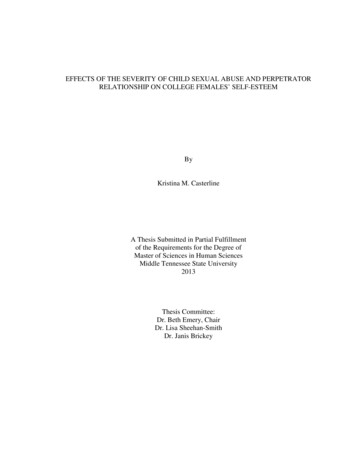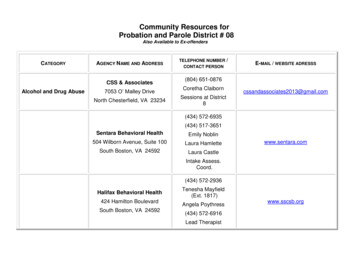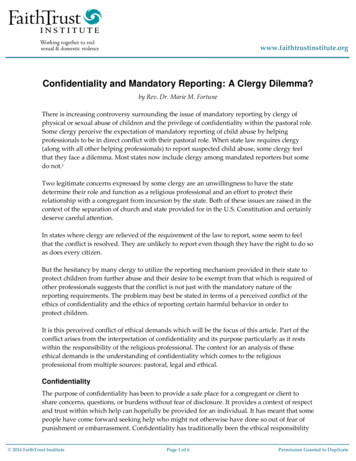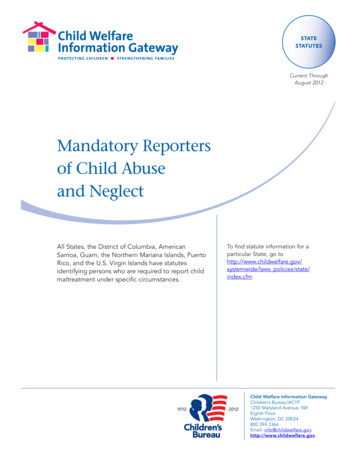
Transcription
STATESTATUTESCurrent ThroughAugust 2012Mandatory Reportersof Child Abuseand NeglectAll States, the District of Columbia, AmericanSamoa, Guam, the Northern Mariana Islands, PuertoRico, and the U.S. Virgin Islands have statutesidentifying persons who are required to report childmaltreatment under specific circumstances.To find statute information for aparticular State, go tohttp://www.childwelfare.gov/systemwide/laws policies/state/index.cfmChild Welfare Information GatewayChildren’s Bureau/ACYF1250 Maryland Avenue, SWEighth FloorWashington, DC 20024800.394.3366Email: info@childwelfare.govhttp://www.childwelfare.gov
Mandatory Reporters of Child Abuse and Neglect rofessionalsPRequired toReporthttp://www.childwelfare.govApproximately 48 States, the District of Columbia, AmericanSamoa, Guam, the Northern Mariana Islands, Puerto Rico, andthe Virgin Islands designate professions whose members aremandated by law to report child maltreatment.1 Individualsdesignated as mandatory reporters typically have frequentcontact with children. Such individuals may include: Social workers Teachers, principals, and other school personnel Physicians, nurses, and other health-care workers Counselors, therapists, and other mental health professionals Child care providers Medical examiners or coroners Law enforcement officersSome other professions frequently mandated across the Statesinclude commercial film or photograph processors (in 12 States,Guam, and Puerto Rico), substance abuse counselors (in 14States), and probation or parole officers (in 17 States).2 Directors,employees, and volunteers at entities that provide organizedactivities for children, such as camps, day camps, youth centers,and recreation centers, are required to report in 11 States.3Seven States and the District of Columbia include domesticviolence workers on the list of mandated reporters, while sevenStates and the District of Columbia include animal controlor humane officers.4 Court‑appointed special advocates areThe word “approximately” is used to stress the fact that States frequently amend theirlaws. This information is current only through June 2012. At that time, New Jersey andWyoming were the only two States that did not enumerate specific professional groups asmandated reporters but required all persons to report.2Film processors are mandated reporters in Alaska, California, Colorado, Georgia,Illinois, Iowa, Louisiana, Maine, Missouri, Oklahoma, South Carolina, and West Virginia.Substance abuse counselors are required to report in Alaska, California, Connecticut,Illinois, Iowa, Kansas, Massachusetts, Nevada, New York, North Dakota, Oregon, SouthCarolina, South Dakota, and Wisconsin. Probation or parole officers are mandatedreporters in Arkansas, California, Colorado, Connecticut, Hawaii, Illinois, Louisiana,Massachusetts, Minnesota, Missouri, Nevada, North Dakota, South Dakota, Texas,Vermont, Virginia, and Washington.3California, Hawaii, Louisiana, Maine, Nevada, New York, Ohio, Oregon, Vermont,Virginia, and West Virginia.4Domestic violence workers are mandated reporters in Alaska, Arizona, Arkansas,Connecticut, Illinois, Maine, and South Dakota. Humane officers are mandated reportersin California, Colorado, Illinois, Maine, Ohio, Virginia, and West Virginia.1This material may be freely reproduced and distributed. However, when doing so, please credit Child Welfare InformationGateway. Available online at http://www.childwelfare.gov/systemwide/laws policies/statutes/manda.cfm2
Mandatory Reporters of Child Abuse and Neglecthttp://www.childwelfare.govmandatory reporters in 10 States.5 Members of the clergy noware required to report in 27 States and Guam.6Four States now have designated as mandatory reportersfaculty, administrators, athletics staff, and other employees andvolunteers at institutions of higher learning, including public andprivate colleges and universities and vocational and technicalschools.7 eporting byROther PersonsS tandardsfor Making aReportIn approximately 18 States and Puerto Rico, any person whosuspects child abuse or neglect is required to report. Ofthese 18 States, 16 States and Puerto Rico specify certainprofessionals who must report but also require all persons toreport suspected abuse or neglect, regardless of profession.8New Jersey and Wyoming require all persons to report withoutspecifying any professions. In all other States, territories, and theDistrict of Columbia, any person is permitted to report. Thesevoluntary reporters of abuse are often referred to as “permissivereporters.”The circumstances under which a mandatory reporter must makea report vary from State to State. Typically, a report must bemade when the reporter, in his or her official capacity, suspectsor has reasons to believe that a child has been abused orneglected. Another standard frequently used is in situations inwhich the reporter has knowledge of, or observes a child beingsubjected to, conditions that would reasonably result in harm tothe child. Permissive reporters follow the same standards whenelecting to make a report.Arkansas, California, Louisiana, Maine, Montana, Oregon, South Carolina, Virginia,Washington, and Wisconsin.6Alabama, Arizona, Arkansas, California, Colorado, Connecticut, Georgia, Illinois,Louisiana, Maine, Massachusetts, Michigan, Minnesota, Mississippi, Missouri, Montana,Nevada, New Hampshire, New Mexico, North Dakota, Ohio, Oregon, Pennsylvania, SouthCarolina, Vermont, West Virginia, and Wisconsin. For more information, see Child WelfareInformation Gateway’s Clergy as Mandatory Reporters of Child Abuse and Neglect athttp://www.childwelfare.gov/systemwide/laws policies/statutes/clergymandated.cfm7Louisiana, Oregon, Virginia, and Washington.8Delaware, Florida, Idaho, Indiana, Kentucky, Maryland, Mississippi, Nebraska, NewHampshire, New Mexico, North Carolina, Oklahoma, Rhode Island, Tennessee, Texas, andUtah.5This material may be freely reproduced and distributed. However, when doing so, please credit Child Welfare InformationGateway. Available online at http://www.childwelfare.gov/systemwide/laws policies/statutes/manda.cfm3
Mandatory Reporters of Child Abuse and Neglect vMandatory reporting statutes also may specify when acommunication is privileged. “Privileged communications” isthe statutory recognition of the right to maintain confidentialcommunications between professionals and their clients,patients, or congregants. To enable States to provide protectionto maltreated children, the reporting laws in most States andterritories restrict this privilege for mandated reporters. Allbut three States and Puerto Rico currently address the issue ofprivileged communications within their reporting laws, eitheraffirming the privilege or denying it (i.e., not allowing privilegeto be grounds for failing to report).9 For instance: The physician-patient and husband-wife privileges are themost common to be denied by States. The attorney-client privilege is most commonly affirmed. The clergy-penitent privilege is also widely affirmed,although that privilege usually is limited to confessionalcommunications and, in some States, denied altogether.10I nclusion ofthe Reporter’sName in theReportMost States maintain toll-free telephone numbers forreceiving reports of abuse or neglect.11 Reports may be madeanonymously to most of these reporting numbers, but Statesfind it helpful to their investigations to know the identity ofreporters. Approximately 18 States, the District of Columbia,American Samoa, Guam, and the Virgin Islands currentlyrequire mandatory reporters to provide their names and contactinformation, either at the time of the initial oral report or aspart of a written report.12 The laws in Connecticut, Delaware,Connecticut, Mississippi, and New Jersey do not currently address the issue ofprivileged communications within their reporting laws. The issue of privilege may beaddressed elsewhere in the statutes of these States, such as rules of evidence.10New Hampshire, North Carolina, Oklahoma, Rhode Island, Texas, West Virginia, andGuam disallow the use of the clergy-penitent privilege as grounds for failing to reportsuspected child abuse or neglect. For a more complete discussion of the requirementfor clergy to report child abuse and neglect, see the Information Gateway’s Clergyas Mandatory Reporters of Child Abuse and Neglect at http://www.childwelfare.gov/systemwide/laws policies/statutes/clergymandated.cfm11For State-specific information about these hotlines, see Information Gateway’sChild Abuse Reporting Numbers at http://www.childwelfare.gov/pubs/reslist/rl dsp.cfm?rs id 5&rate chno 11-1117212California, Colorado, Florida, Illinois, Indiana, Iowa, Louisiana, Maine, Massachusetts,Minnesota, Mississippi, Missouri, Nebraska, New Mexico, New York, North Carolina,Pennsylvania, and Vermont have this requirement.9This material may be freely reproduced and distributed. However, when doing so, please credit Child Welfare InformationGateway. Available online at http://www.childwelfare.gov/systemwide/laws policies/statutes/manda.cfm4
Mandatory Reporters of Child Abuse and Neglecthttp://www.childwelfare.govand Washington allow child protection workers to request thename of the reporter. In Wyoming, the reporter does not have toprovide his or her identity as part of the written report, but if theperson takes and submits photographs or x-rays of the child, hisor her name must be provided. isclosure ofDthe Reporter’sIdentityAll jurisdictions have provisions in statute to maintain theconfidentiality of abuse and neglect records. The identity of thereporter is specifically protected from disclosure to the allegedperpetrator in 39 States, the District of Columbia, Puerto Rico,American Samoa, Guam, and the Northern Mariana Islands.13This protection is maintained even when other information fromthe report may be disclosed.Release of the reporter’s identity is allowed in some jurisdictionsunder specific circumstances or to specific departments orofficials. For example, disclosure of the reporter’s identity canbe ordered by the court when there is a compelling reason todisclose (in California, Mississippi, Tennessee, Texas, and Guam)or upon a finding that the reporter knowingly made a falsereport (in Alabama, Arkansas, Connecticut, Kentucky, Louisiana,Minnesota, South Dakota, Vermont, and Virginia). In somejurisdictions (California, Florida, Minnesota, Tennessee, Texas,Vermont, the District of Columbia, and Guam), the reporter canwaive confidentiality and give consent to the release of his orher name.This publication is a product of the State Statutes Seriesprepared by Child Welfare Information Gateway. Whileevery attempt has been made to be complete, additionalinformation on these topics may be in other sections of aState’s code as well as agency regulations, case law, andinformal practices and procedures.The statutes in Alaska, Arizona, Delaware, Idaho, Maryland, Massachusetts, NewHampshire, Oklahoma, Rhode Island, West Virginia, Wyoming, and the Virgin Islands donot specifically protect reporter identity but do provide for confidentiality of records ingeneral.13This material may be freely reproduced and distributed. However, when doing so, please credit Child Welfare InformationGateway. Available online at http://www.childwelfare.gov/systemwide/laws policies/statutes/manda.cfm5
Mandatory Reporters of Child Abuse and Neglecthttp://www.childwelfare.govSuggested Citation: Child Welfare Information Gateway. (2012).Mandatory reporters of child abuse and neglect. Washington,DC: U.S. Department of Health and Human Services,Children’s Bureau.This material may be freely reproduced and distributed. However, when doing so, please credit Child Welfare InformationGateway. Available online at http://www.childwelfare.gov/systemwide/laws policies/statutes/manda.cfm6
Mandatory Reporters of Child Abuse and nals Required to ReportAla. Code § 26-14-3Reports are required from all of the following: Hospitals, clinics, sanitariums, doctors, physicians, surgeons, medical examiners, coroners, dentists, osteopaths,optometrists, chiropractors, podiatrists, pharmacists, and nursesTeachers and school officialsPeace officers and law enforcement officialsSocial workersDaycare workers or employeesMental health professionalsMembers of the clergyAny other person called upon to render aid or medical assistance to a childReporting by Other PersonsAla. Code § 26-14-4Any other person who has reasonable cause to suspect that a child is being abused or neglected may report.Standards for Making a ReportAla. Code § 26-14-3A report must be made when the child is known or suspected of being a victim of abuse or neglect.Privileged CommunicationsAla. Code §§ 26-14-3; 26-14-10Only clergy-penitent and attorney-client privileges are permitted.Inclusion of Reporter’s Name in ReportThe reporter is not specifically required by statute to provide his or her name in the report.Disclosure of Reporter IdentityAla. Code § 26-14-8The department will not release the identity of the reporter except under court order when the court has determined thatthe reporter knowingly made a false report.AlaskaProfessionals Required to ReportAlaska Stat. §§ 47.17.020; 47.17.023The following persons are required to report: Health practitioners or administrative officers of institutionsTeachers and school administratorsChild care providersPaid employees of domestic violence and sexual assault programs, crisis intervention and prevention programs, ororganizations that provide counseling or treatment to individuals seeking to control their use of drugs or alcoholPeace officers or officers of the Department of CorrectionsPersons who process or produce visual or printed matter, either privately or commerciallyMembers of a child fatality review team or the multidisciplinary child protection teamThis material may be freely reproduced and distributed. However, when doing so, please credit Child Welfare InformationGateway. Available online at http://www.childwelfare.gov/systemwide/laws policies/statutes/manda.cfm7
Mandatory Reporters of Child Abuse and Neglecthttp://www.childwelfare.govReporting by Other PersonsAlaska Stat. § 47.17.020Mandated reporters may report cases that come to their attention in their nonoccupational capacities. Any other personwho has reasonable cause to suspect that a child has been harmed may report.Standards for Making a ReportAlaska Stat. §§ 47.17.020; 47.17.023A report must be made when, in the performance of his or her occupational duties, a reporter has reasonable cause tosuspect that a child has suffered harm as a result of abuse or neglect.A person providing (either privately or commercially) film, photo, or visual or printed matter processing, production, orfinishing services, or computer installation, repair, or other services, or Internet or cellular telephone services who, inthe process of providing those services, observes a film, photo, picture, computer file, image, or other matter and hasreasonable cause to suspect that the film, photo, picture, computer file, image, or other matter visually depicts a childengaged in conduct described in § 11.41.455(a) [sexual exploitation of a minor or child pornography], shall immediatelyreport the observation to the nearest law enforcement agency.Privileged CommunicationsAlaska Stat. § 47.17.060Neither the physician-patient nor the husband-wife privilege is recognized.Inclusion of Reporter’s Name in ReportThe reporter is not specifically required by statute to provide his or her name in the report.Disclosure of Reporter IdentityThis issue is not addressed in the statutes reviewed.American SamoaProfessionals Required to ReportAnn. Code § 45.2002The following persons are required to report: Physicians or surgeons, including physicians in training, osteopaths, optometrists, chiropodists, podiatrists, childhealth associates, medical examiners or coroners, dentists, nurses, or hospital personnelChristian Science practitionersSchool officials or employeesSocial workers or workers in family care homes or child care centersMental health professionalsReporting by Other PersonsAnn. Code § 45.2002All other persons are urged and authorized to report.Standards for Making a ReportAnn. Code § 45.2002A report is required when: A reporter has reasonable cause to know or suspect that a child has been subjected to abuse or neglect.A reporter has observed the child being subjected to circumstances or conditions that would result in abuse orneglect.This material may be freely reproduced and distributed. However, when doing so, please credit Child Welfare InformationGateway. Available online at http://www.childwelfare.gov/systemwide/laws policies/statutes/manda.cfm8
Mandatory Reporters of Child Abuse and Neglecthttp://www.childwelfare.govPrivileged CommunicationsAnn. Code § 45.2016The physician-patient privilege and the husband-wife privilege are not recognized as grounds for excluding evidence.Inclusion of Reporter’s Name in ReportAnn. Code § 45.2010The name, address, and occupation of the person making the report must be included in the report.Disclosure of Reporter IdentityAnn. Code § 45.2027The identity of the reporter is not released to the subject of the report if that release would be detrimental to the safetyor interests of the reporter.ArizonaProfessionals Required to ReportRev. Stat. § 13-3620The following persons are required to report: Physicians, physician’s assistants, optometrists, dentists, behavioral health professionals, nurses, psychologists,counselors, or social workersPeace officers, members of the clergy, priests, or Christian Science practitionersParents, stepparents, or guardiansSchool personnel or domestic violence victim advocatesAny other person who has responsibility for the care or treatment of minorsReporting by Other PersonsRev. Stat. § 13-3620Any other person who reasonably believes that a minor is a victim of abuse or neglect may report.Standards for Making a ReportRev. Stat. § 13-3620A report is required when the reporter reasonably believes that a minor is a victim of abuse or neglect.Privileged CommunicationsRev. Stat. § 13-3620Only the attorney-client and the clergy-penitent privileges are recognized.Inclusion of Reporter’s Name in ReportThe reporter is not specifically required by statute to provide his or her name in the report.Disclosure of Reporter IdentityThis issue is not addressed in the statutes reviewed.This material may be freely reproduced and distributed. However, when doing so, please credit Child Welfare InformationGateway. Available online at http://www.childwelfare.gov/systemwide/laws policies/statutes/manda.cfm9
Mandatory Reporters of Child Abuse and onals Required to ReportAnn. Code § 12-18-402The following individuals are mandated reporters: Child care, daycare, or foster care workersCoronersDentists and dental hygienistsDomestic abuse advocates and domestic violence shelter employees or volunteersEmployees of the Department of Human ServicesEmployees working under contract for the Division of Youth Services of the Department of Human ServicesFoster parentsJudges, law enforcement officials, peace officers, and prosecuting attorneysLicensed nurses, physicians, mental health professionals, surgeons, resident interns, osteopathsMedical personnel who may be engaged in the admission, examination, care, or treatment of personsSchool counselors, officials, and teachersSocial workers and juvenile intake or probation officersCourt-appointed special advocate program staff members or volunteersAttorneys ad litemClergy members, including ministers, priests, rabbis, accredited Christian Science practitioners, or other similarfunctionary of a religious organizationEmployees of a child advocacy center or a child safety centerSexual abuse advocates or volunteers who work with victims of sexual abuse as employees of a community-basedvictim service or mental health agency such as Safe Places, United Family Services, or Centers for Youth andFamiliesRape crisis advocates or volunteersChild abuse advocates or volunteers who work with child victims of abuse or maltreatment as employees of acommunity-based victim service or a mental health agencyVictim/witness coordinatorsVictim assistance professionals or volunteersEmployees of the Crimes Against Children Division of the Department of Arkansas State PoliceReporting by Other PersonsAnn. Code § 12-18-401Any person who has reasonable cause to suspect child maltreatment may report.Standards for Making a ReportAnn. Code § 12-18-402An individual listed as a mandatory reporter shall immediately notify the Child Abuse Hotline if he or she: Has reasonable cause to suspect that a child has been subjected to maltreatment or died as a result ofmaltreatmentObserves a child being subjected to conditions or circumstances that would reasonably result in maltreatmentThis material may be freely reproduced and distributed. However, when doing so, please credit Child Welfare InformationGateway. Available online at http://www.childwelfare.gov/systemwide/laws policies/statutes/manda.cfm10
Mandatory Reporters of Child Abuse and Neglecthttp://www.childwelfare.govPrivileged CommunicationsAnn. Code §§ 12-18-402(c); 12-18-803A privilege or contract shall not prevent a person from reporting child maltreatment when he or she is a mandatedreporter and required to report under this section.No privilege, except that between a lawyer and a client and between a minister, including a Christian Sciencepractitioner, and a person confessing to or being counseled by a minister, shall prevent anyone from testifyingconcerning child maltreatment.When a physician, psychologist, psychiatrist, counselor, or therapist conducts interviews with or provides therapyto a subject of a report of suspected child maltreatment for purposes related to child maltreatment, the physician,psychologist, psychiatrist, licensed counselor, or therapist is deemed to be performing services on behalf of the child.An adult subject of a report of suspected child maltreatment cannot invoke privilege on the child’s behalf.Inclusion of Reporter’s Name in ReportAnn. Code § 12-18-302A mandated reporter may report child maltreatment or suspected child maltreatment by telephone call, facsimiletransmission, or online reporting.Facsimile transmission and online reporting may be used in nonemergency situations by an identified mandated reporterwho provides the following contact information: Name and phone numberIn the case of online reporting, his or her email addressA mandated reporter who wishes to remain anonymous shall make a report through the toll-free Child Abuse Hotlinetelephone system.Disclosure of Reporter IdentityAnn. Code § 12-18-909The identity of the reporter shall not be disclosed unless a court determines that the reporter knowingly made a falsereport.This material may be freely reproduced and distributed. However, when doing so, please credit Child Welfare InformationGateway. Available online at http://www.childwelfare.gov/systemwide/laws policies/statutes/manda.cfm11
Mandatory Reporters of Child Abuse and sionals Required to ReportPenal Code § 11165.7Mandated reporters include any of the following: Teachers, teacher’s aides, administrators, and classified employees of any public or private schoolAdministrators or employees of day camps, youth centers, or youth recreation programsEmployees of a county office of education or the State Department of EducationLicensees, administrators, or employees of licensed community care or child daycare facilitiesHead Start program teachersWorkers or evaluators employed by a licensing agencyPublic assistance workersFoster parents, group home personnel, and personnel of residential care facilitiesSocial workers, probation officers, and parole officersEmployees of school district police or security departmentsAdministrators, presenters, or counselors for child abuse prevention programsDistrict attorney investigators, inspectors, or local child support agency caseworkersPeace officers and firefighters, except for volunteer firefightersPhysicians, surgeons, psychiatrists, psychologists, dentists, residents, interns, podiatrists, chiropractors, licensednurses, dental hygienists, optometrists, marriage and family therapistsClinical counselors, trainees, interns, and social workersEmergency medical technicians and paramedicsPsychological assistantsMarriage and family therapist trainees and internsState or county public health employees who treat minors for venereal diseases or other conditionsCoroners and medical examinersCommercial film and photographic print processorsChild visitation monitorsAnimal control or humane society officersClergy members and custodians of records of clergy membersEmployees of police departments, county sheriff’s departments, county probation departments, or county welfaredepartmentsEmployees or volunteers of a Court-Appointed Special Advocate programIndividuals providing services to minor childrenAlcohol and drug counselorsReporting by Other PersonsPenal Code § 11166Any other person who reasonably suspects that a child is a victim of abuse or neglect may report.For the purposes of this section, ‘any other person’ includes a mandated reporter who acts in his or her private capacityand not in his or her professional capacity, or within the scope of his or her employment.This material may be freely reproduced and distributed. However, when doing so, please credit Child Welfare InformationGateway. Available online at http://www.childwelfare.gov/systemwide/laws policies/statutes/manda.cfm12
Mandatory Reporters of Child Abuse and Neglecthttp://www.childwelfare.govStandards for Making a ReportPenal Code §§ 11166; 11165.7A report is required when: A mandated reporter, in his or her professional capacity, or within the scope of his or her employment, hasknowledge of or observes a child whom the reporter knows or reasonably suspects is the victim of abuse orneglect.Commercial film and photographic print processors have knowledge of or observe any film, photograph,videotape, negative, or slide depicting a child under age 16 engaged in an act of sexual conduct.For the purposes of this article, ‘reasonable suspicion’ means that it is objectively reasonable for a person to entertaina suspicion, based upon facts that could cause a reasonable person in a like position, drawing, when appropriate, onhis or her training and experience, to suspect child abuse or neglect. ‘Reasonable suspicion’ does not require certaintythat child abuse or neglect has occurred nor does it require a specific medical indication of child abuse or neglect; any‘reasonable suspicion’ is sufficient. For the purposes of this article, the pregnancy of a minor does not, in and of itself,constitute a basis for a reasonable suspicion of sexual abuse.Privileged CommunicationsPenal Code § 11166The clergy-penitent privilege is permitted for penitential communications. This does not modify or limit a clergymember’s duty to report known or suspected child abuse or neglect when the clergy member is acting in some othercapacity that would otherwise make the clergy member a mandated reporter.Inclusion of Reporter’s Name in ReportPenal Code § 11167Reports of mandated reporters shall include: The name, business address, and telephone number of the mandated reporterThe capacity that makes the person a mandated reporterReports of other persons do not require the reporter’s name.Disclosure of Reporter IdentityPenal Code § 11167The identity of the reporter shall be confidential and disclosed only: Among agencies receiving or investigating mandated reportsTo the prosecutor in a criminal prosecution or in an action initiated under § 602 of the Welfare and InstitutionsCode arising from alleged child abuseTo counsel appointed pursuant to § 317(c) of the Welfare and Institutions CodeTo the county counsel or prosecutor in a proceeding under Part 4 (commencing with Section 7800) of Division 12of the Family Code or § 300 of the Welfare and Institutions CodeTo a licensing agency when abuse or neglect in out-of-home care is reasonably suspectedWhen the reporter waives confidentialityBy court orderThis material may be freely reproduced and distributed. However, when doing so, please credit Child Welfare InformationGateway. Available online at http://www.childwelfare.gov/systemwide/laws policies/statutes/manda.cfm13
Mandatory Reporters of Child Abuse and onals Required to ReportRev. Stat. § 19-3-304Persons required to report include: Physicians, surgeons, physicians in training, child health associates, medical examiners, coroners, dentists,osteopaths, optometrists, chiropractors, podiatrists, nurses, hospital personnel, dental hygienists, physicaltherapists, pharmacists, registered dieticiansPublic or private school officials or employeesSocial workers, Christian Science practitioners, mental health professionals, psychologists, professional counselors,marriage and family therapists, or psychotherapistsVeterinarians, peace officers, firefighters, or victim’s advocatesCommercial film and photographic print processorsClergy members, including priests; rabbis; duly ordained, commissioned, or licensed ministers of a church;members of religious orders; or recognized leaders of any religious bodiesWorkers in the State Department of Human ServicesJuvenile parole and probation officersChild and family investigatorsOfficers and agents of the State Bureau of Animal Protection and animal control officersThe child protection ombudsmanEducators providing services through a Federal special supplem
mandated reporters but required all persons to report. 2 Film processors are mandated reporters in Alaska, California, Colorado, Georgia, Illinois, Iowa, Louisiana, Maine, Missouri, Oklahoma, South Carolina, and West Virginia. Substance abuse counselors are required to report in Alaska, California, Connecticut,

